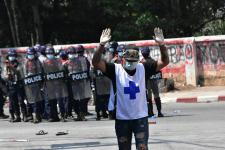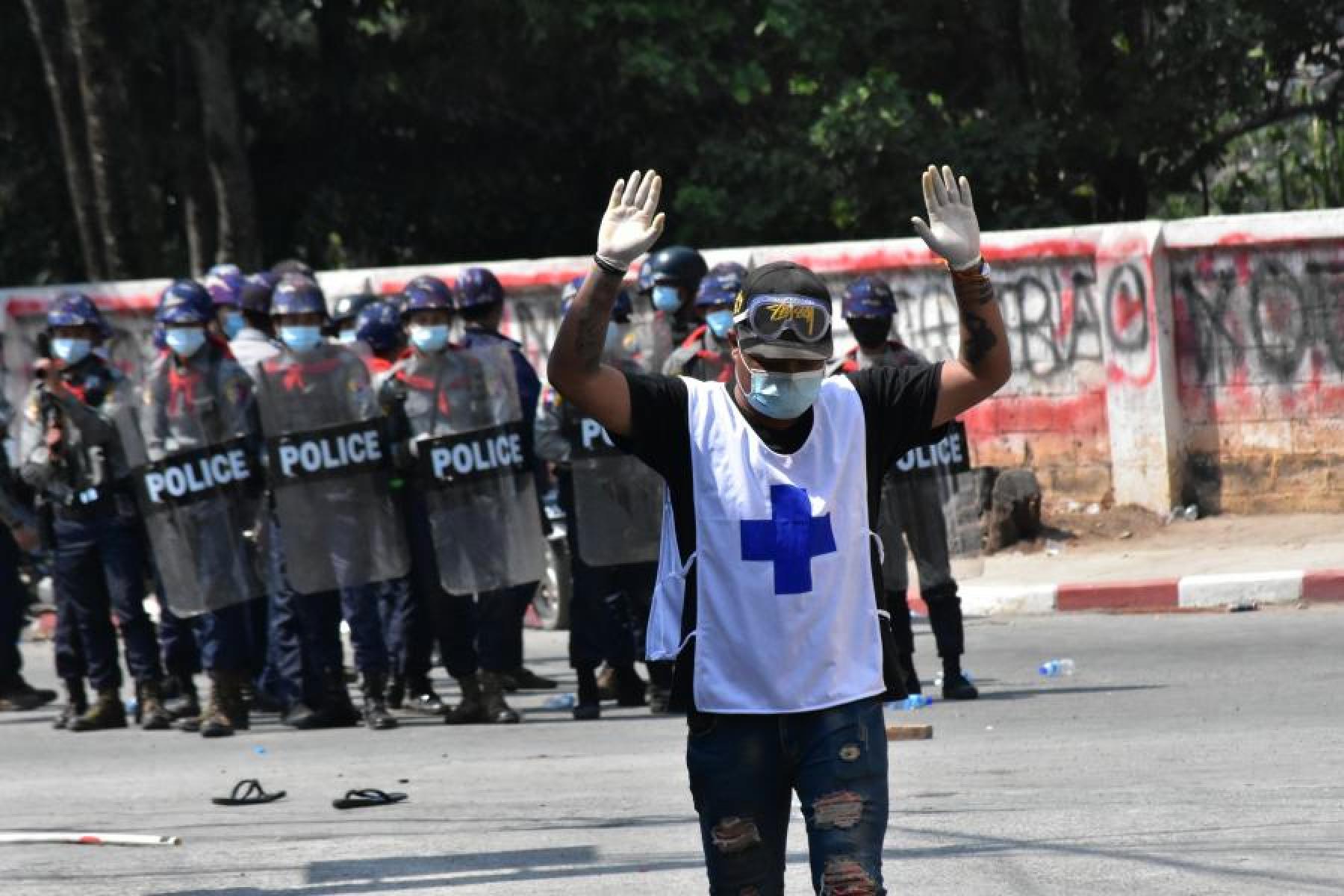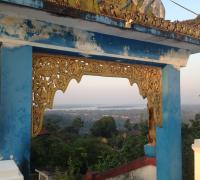The military junta in Myanmar weaponizes COVID-19 against its opponents

Since June, the new Delta variant of COVID-19 has hit Myanmar extremely hard. The amount of infected and deaths is so evident, that everyone I encounter knows both someone who has lost their lives and a great number of families and neighbors who has been affected.
It all indicates that the pandemic is completely out of control; there is not enough oxygen, the hospitals are full, it is almost impossible or extremely expensive to acquire protective equipment and medicine, and the crematoriums are overburdened. This comes on top of a deep economic and political crisis after the military on February 1st staged a coup and ousted the elected government.
Before the coup, the NLD government under the de facto leadership of Aung San Suu Kyi was already well under its way with a vaccine program, and the previous lockdowns in the first and second COVID waves had prevented the pandemic from getting out of hand. But the military coup put an end to the vaccine program and has almost led the healthcare system to a total collapse; there are only few test centers, and the new military regime has failed to reestablish a lockdown.
Since the coup, the military junta has not been concerned with ensuring public health provision, quit the contrary; they have focused on consolidating power and defeating the massive current public resistance to the coup. Approximately 1020 civilians have lost their lives, many thousands have been arrested, and even more have been and continues to be persecuted in the army’s attempt to defeat the resistance. In recent months, daily fights between the military and resistance groups have ravaged the country, and the economy and various sectors have been severely deteriorated. The military has officially put itself in power but has neither control over nor trust amongst the population.
With the chaos and instability created by the coup it is no surprise that the third COVID-19 wave featuring the Delta variant has run amok. Simultaneously, the military junta shows few, if any, signs of determination to help the public survive the pandemic unless they are part of the military’s own network or officially supports the military regime.
Healthcare personnel are hunted by the army
Since the coup, one of the most prominent professional groups to have been persecuted by the military is the public healthcare personnel. This is very likely due to the fact that doctors and nurses were among the first to go on strike and join the civil disobedience movement (CDM) against the military coup.
In recent months, we have seen military soldiers occupying hospitals around the country and arresting doctors, among others, who refused to resume work under the leadership of the military junta. According to the AAPP, which records deaths and arrests related to the military's attacks on civilians, 157 doctors have been arrested since the coup including the former head of Myanmar's COVID-19 vaccine program. In addition, seven doctors have been killed. According to the UN’s Special Rapporteur on the situation of human rights in Myanmar, the military junta has also issued about 500 arrest warrants against striking doctors who now have gone into hiding. The consequences for the healthcare system are devastating, and has become particularly evident after the Delta variant reached Myanmar.
Since June, the junta has admittedly issued orders for doctors and nurses to return to work to remedy the COVID-19 situation, but at the same time the Junta continues to persecute health workers and other opponents.
Some doctors have said that they fear falling into a trap and being arrested if they show up at the hospital. And this fear is not without reason; in July, it was reported that soldiers attacked a private clinic where doctors and nurses were in the process of treating COVID-19 patients. Five doctors were arrested. Indeed, it was a trap. People from the military had anonymously contacted a COVID-19 hotline created by the striking doctors which led them to the clinic.
This episode outraged many people in Myanmar as it circulated on social media. It reinforced the deep distrust of the military's willingness to help COVID-19 patients and counter the spread of the pandemic. As a striking doctor told CNN in July, there is much to suggest, that the junta is using the pandemic as a weapon against the vast majority of the population who do not accept the military coup.
The military takes care of their own
The military in Myanmar has its own hospitals and healthcare personnel, and a general impression among the population suggests that the military intentionally secures its own with treatment and vaccines. It is reported by several that COVID-19 infected persons have been denied access to the military hospitals. Others are afraid to go to the public hospitals, not only because they are understaffed, lack oxygen, and have power cuts, but also because they are guarded by soldiers.
At the same time, the military tried to prevent people from gaining private access to oxygen. For instance, the military junta has banned some of the private oxygen producers from selling to civilians and to humanitarian groups, arguing in public that it was because the junta wanted to reserve oxygen for the hospitals and that it wanted to prevent hoarding.
On social media, there have also been photos and reports that soldiers have threatened people with arrests if they remained in the queues to buy oxygen. In at least one incident in Yangon a queue for oxygen was shelled by soldiers. In another incidence, about 50 soldiers arrived in military vehicles with empty oxygen cylinders jogging the civilians away from the queue so that the soldiers' own bottles could be refilled.
My close colleague, Mala (anonymized name), also told me that the military junta repeatedly closed factories producing oxygen. "It is obvious that the military does not want us to be able to help ourselves and our families now that the hospitals will not receive us," she said. She also said that her friend, who is married to someone in the military, had told her that if she wanted easy access to oxygen, she might as well use the name of her husband. Everyone related to the military gets easy access to oxygen, the friend said. But Mala would rather wait two days in a queue to help a sick friend than using a military person’s name. Like many others, she and her sick friend are opposed to the junta.
It is evident that the military junta has been trying to monopolize power in the event of the COVID-19, but in reality, it has had little control over it and seems neither willing, nor able, to treat and protect the public. On the sixth-month anniversary of the coup, the army chief, Min Aung Hlaing, expressed in his TV speech that his regime has a plan of action regarding COVID-19. However, the trust among the people is almost non-existent.
Instead, people have by and large resorted to self-help outside the military. But self-help is not without risks, and with the restrictions the military junta has been trying to implement, a huge black market with towering prices has emerged for medicine, oxygen, cremations, and protective equipment just as under previous military regimes. A close contact told me that the price of diabetes medicine has more than quintupled in the past two months, and that the price of refilling oxygen bottles has reached a price which only wealthy people can afford.
People help each other outside the military
The devastating situation has since June created a dire need for people to help each other outside the military. And they have done so in different ways, replicating a long tradition in Myanmar, where skepticism of the authorities has deep roots due to the many previous periods of military rule. In numerous neighborhoods in Yangon, and elsewhere in the country, groups of volunteers have come together with the help of private donations to organize oxygen, food, medicine, and transport for the sick and dead. For instance, the ill families have been putting up white and yellow flags made of pieces of clothing outside their windows to signal their need for food or medicine.
Many of the striking doctors and nurses who went underground have also been trying their best to treat people at private underground clinics or by providing telephone- and online consultations to sick people and their relatives. They have mostly used encrypted apps to avoid being detected by the junta, who is reputed for monitoring mobile communications. Everyone must be wary, including the voluntary groups, as some of them are associated with the opposition, including Aung San Suu Kyi's party NLD.
In some places, people have also been cautious of putting out yellow and white flags because they are afraid that soldiers and police will see them as a sign of support for the anti-military agenda. As another colleague from Yangon told me, there are daily raids in private homes in her neighborhood, where police and soldiers are looking for evidence of anti-military conduct. Another friend, who is now in a village in the northeastern part of the country, similarly told me that in early August soldiers arrested two female volunteers, who are not politically active at all, but who simply assisted with funeral preparations. Here, people had also been told that they would get arrested if they did not possess a stamped paper from the junta's local authority with permission to buy oxygen.
Many people spend a lot of their time helping friends and family, which can have major financial and time costs. For example, Mala, who had COVID-19 in the second wave last year before the military coup, acquired a bottle of oxygen at that time. Since June, she has spent a lot of her time bringing oxygen bottles to sick friends and neighbors in Yangon. It is expensive and typically takes two to three days to get the bottle refilled. First, she must stand in line to get a stamped paper from the local authority, and then she must stand in line to get the tank filled. On many days she also has to queue at the ATM machine to get out cash to pay for the oxygen, medicine, and food. And with the rising black-market prices, due to the junta's restrictions, it is hard to gather enough cash.
Mala still receives salary from the NGO she works for, but many of her associates have lost their income since the coup. For those, and many others who now lives in increasing poverty, the access to oxygen is impossible without the help of more affluent contacts, volunteer groups, or humanitarian organizations.
In the border areas, which are largely controlled by ethnic armed organizations, the situation is also desperate. Many from the cities have fled here because they are being persecuted by the army. Currently, the healthcare systems that ethnic armed organizations have supported for decades are trying to remedy the COVID-19 situation as best they can. This is for instance done with the help of private donations and support from charities that operate across borders e.g. with Thailand. But these ethnic organisations are also constantly being attacked by the junta's forces. There have also been cases where emergency aid received across the border from Thailand was confiscated by soldiers. Much suggests that the military junta has been doing everything in its power to diminish or prevent all parallel forms of aid provided to tackle the COVID-19 situation. This way of operating is informed by a deeper perception within the army that those who operate outside the army’s own system are potential enemies who must be defeated.
Distrust of the military junta's vaccinations
As with access to oxygen, the military junta is similarly trying to establish control over Covid-vaccinations. Here, too, there is great distrust of the junta and a growing privatization and black-market trading. In his TV speech on August 1, the army chief, who on that very day appointed himself as prime minister, stated that 50 percent of the population would be vaccinated by the end of 2021. The vaccines come from China and perhaps also Russia.
In the following days, the junta’s people began organizing vaccinations at the local level for everyone over the age of 65. But numerous people in the country do not trust the military junta's vaccine program, and some even fear arrests if they visit the vaccine spots that are guarded by soldiers. They are also unsure whether the vaccines used by the military from China are reliable.
Mala told me, that she drove in a taxi past a school in Yangon in early August and saw a large military vehicle parked outside. She asked the driver what was going on, and he told her they were giving vaccinations. But there was no line outside and she could not spot any people.
Another colleague of mine, who now lives in her home village in southeastern Myanmar, told me that only the elderly who are not directly opposed to the military coup agrees to a junta-provided vaccine. Her own mother is anti-military, and although she has not participated in the active resistance, she refuses to receive the military’s vaccine.
The lack of trust is huge. Although those I regularly speak with believe that vaccinations are important to control the pandemic, they would rather not take the vaccine than show up at one of the military vaccination sites. Instead, they prefer to wait for private vaccinations Several private companies, charities, and NGO’s have started offering their employees vaccinations. But for many the access to vaccination outside the military system will imply huge financial costs that will be hard for them to meet. For example, one of my close colleagues was informed that while the military junta has banned private hospitals from selling vaccines, it is possible to get the Indian vaccine via the black market for 240.000 kyat (approx. USD 145) and two million kyat (approx. USD 1.400) for the Pfizer-BioNtech vaccine. But with a population of 54 million and increasing levels of poverty, the prospects of bringing the pandemic under control through such private initiatives looks very bleak. In this case, much broader humanitarian initiatives are needed, and the outside world must also step up.
Urgent need for international action
Every day on social media there have been desperate calls for help from the international community. With the rampant spread of COVID-19 and the junta's mismanagement of the situation, Myanmar is at great risk of becoming a new super-spreading country, not unlikely resulting in new mutations. In other words, there is an urgent need to act on the crisis, both to help the people of Myanmar, the region, and the rest of the world. But there are significant challenges and dilemmas associated with international aid.
Since the coup on February 1st, there has been no lack of international condemnations of the military takeover and violence against peaceful protesters. And Western countries, including the EU, have also issued important sanctions on the military elite and its allies. Countries like Denmark were quick to redirect state-to-state aid to pro-democracy civil society organizations to avoid legitimizing and supporting the military junta. But the broad international action has been paralyzed by the region's lack of consensus and by China and Russia's right of veto in the UN Security Council.
In the spring, ASEAN presented a five-point plan for Myanmar, which, among other things, includes access to deliver humanitarian aid. The plan has not yet been executed, except that ASEAN has appointed and sent out a delegate to deliberate with the junta. The people of Myanmar have lost faith in ASEAN, partly because ASEAN has not yet been in dialogue with the opposition to the junta but only consulted the army chief and his junta.
The massive resistance to the junta inside Myanmar makes it very difficult to picture a COVID-19 operation in which all parties in the country cooperate and coordinate around international support. The opposition and the junta see each other as terrorist groups, and any kind of negotiation or reconciliation between them is currently unrealistic even in the face of a catastrophic humanitarian situation and health crisis.
If COVID-19 support is delivered through the junta’s system, there is a great risk that international agencies will be complicit in legitimizing the junta and in undermining the strong democratic resistance that has risen since February 1st. For instance, the fact that China has started supplying vaccines to the junta, means, that the people now ask themselves whether China indeed supports and accepts the military coup.
International organizations such as Red Cross are currently trying to operate within a neutral humanitarian setup by getting permission from the junta to help in areas with the COVID-pandemic, but that too raises a dilemma since it is very difficult to be neutral in the current political situation.
On this account, there are several international experts who argue that support from UN organizations, donor nations, and humanitarian organizations should be provided through the parallel pro-democratic networks and organizations that exist outside the military system. Among other things, former UN Special Envoy for Myanmar, Yanghee Lee, recommended that international agencies cooperate with the shadow government – the National Unity Government (NUG) – which has been formed by elected NLD MPs and which has members from the ethnic minority groups too.
NUG, together with several health organizations from the ethnic minorities, has formed a Covid Task Force which intends to coordinate the prevention and treatment of COVID-19, including through vaccinations. The task force has explicitly reached out to ASEAN and the UN. Yanghee Lee, along with other international experts, suggests using the task force as a coordinating body to provide support to the numerous networks of civilian and humanitarian groups already providing food, medicine, and other kinds of assistance to the public. A realistic place to start is the ethnic minority areas along Myanmar's borders where the military junta’s control is limited. At the same time, it requires cooperation with Myanmar's neighbors such as Thailand and India so that aid can pass safely across borders.
Support via NUG and the civil society organizations also make sense considering the broader support for democracy in Myanmar. NUG is still young and faces many political challenges, including bringing together the many ethnic groups in the country. But the NUG's pro-democratic political agenda, which aims to create a federal state with civilian control over the military and equal rights for all groups in society – including the Rohingya Muslims – is an important step towards creating an alternative to the military regime.
It is apparent that COVID-19 support through NUG is not without risks and dilemmas as NUG is regarded as a terrorist group by the military junta. Therefore, the international diplomatic work and pressure on the junta to allow free and secure passage for humanitarian aid to Myanmar remains extremely important.
This article was published in Danish at globalnyt.dk on 10th August 2021
DIIS Experts



